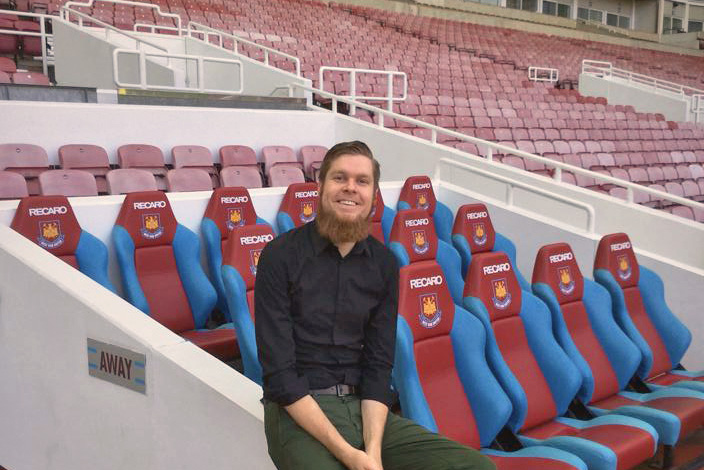Philipp Gollner, associate professor of history, began watching soccer as a boy in Austria. Today, he is dominating the sport ‒ not on the pitch, but in the Goshen College Fantasy Premier League (FPL).
Gollner is competing against 25 students, faculty and staff in the college’s first FPL. As of this week, Gollner is in first place with 504 points; Brian Yoder Schlabach is in second, with 474; and Andy Bennett trails in third, with 425 points.Students, faculty and staff were invited to sign up for the FPL through a link that was sent in the communicator earlier this year.
FPL is, much like most fantasy sports leagues, a platform that allows people to make imaginary teams of real-life players to compete against other teams. You earn points in FPL based on the performances of your players in real life; the better your players perform, the more points you’ll get.
The game is based on the Premier League, a professional soccer league composed of 20 teams across the United Kingdom. In the course of a season that extends from Aug. 13 to May 22, each team plays each other once home and once away. At the end of the season, whichever team has the most points wins. The Premier League is just under a third of the way done, and the top four teams this season have been Manchester United, Manchester City, Liverpool and Chelsea.
Unlike many traditional American sports, soccer games can end in draws. Because of this, teams are rewarded with 3 points after a win, 1 point after a draw and 0 points for a loss. Another difference between American and European sports is the idea of promotion and relegation, where the bottom three teams each season get demoted to a lower league and the top three teams of the league below get promoted to the higher league.
In FPL, your team isn’t decided through a draft, but rather by each player in the league being given 100 million pounds (in fake money) to spend on soccer players, with each soccer player varying in value based on their performances in previous years. Each participant must spend their £100 million on two goalkeepers, five defenders, five midfielders and three forwards.
Finally, once your team is built, you must choose your captain and vice-captain, with the captain earning double points each week and the vice-captain earning 1.5 points per goal.
Elijah Stoltzfus, a first-year Liverpool fan, said, “I’ve always played soccer, but only recently started following it professionally. This is [my] first experience with fantasy sports and I think soccer was a great place to start because I’m already fairly knowledgeable about the sport.”
Stoltzfus is currently sitting in 17th place with 336 points, but he hopes to continue to learn and grow in his understanding of fantasy soccer.
“I’m a novice with fantasy sports in general, so I didn’t land on an optimal mix of star players and hidden gems,” Stoltzfus said.
His advice to aspiring FPL players is to “try to get a feel for who each team trusts and utilizes the most going forward.”
Philipp Gollner, a West Ham fan, noted that “there is a decent amount of this that is luck.”
However, Gollner’s success in the league is also due to strategy. He advises FPL participants to “look at fixtures and identify the players that are probably on a downward curve.”
Gollner’s number one tip is to “[avoid] taking many players from your favorite team.”
This is because FPL participants may feel even worse than usual when their team loses, as it means that the players on their imaginary team are likely underperforming, as well.
Gollner and Stoltzfus agree that FPL helps build relationships.
“Fantasy Premier League is a great way to connect with fellow soccer enthusiasts, and it keeps the game interesting,” Stoltzfus said.
Readers who are interested in joining the GC FPL next year can keep an eye out in the Communicator for more information.




